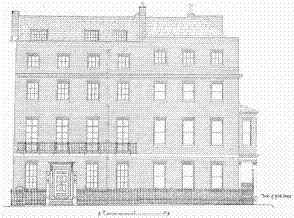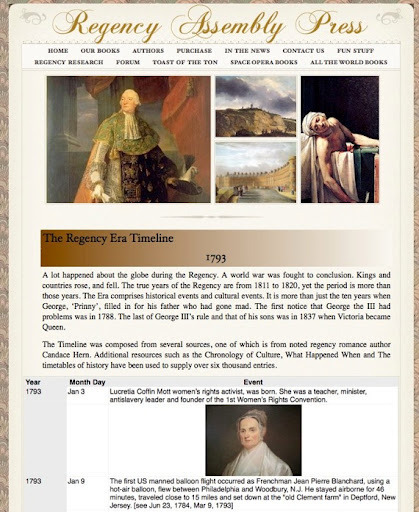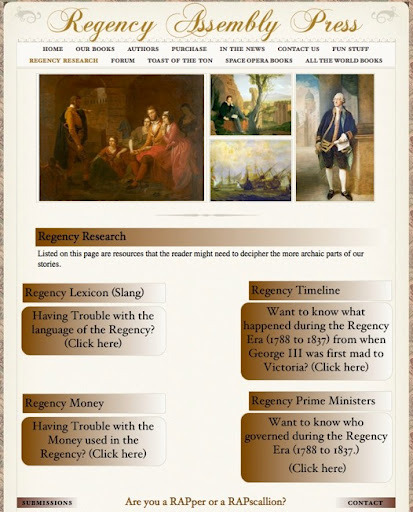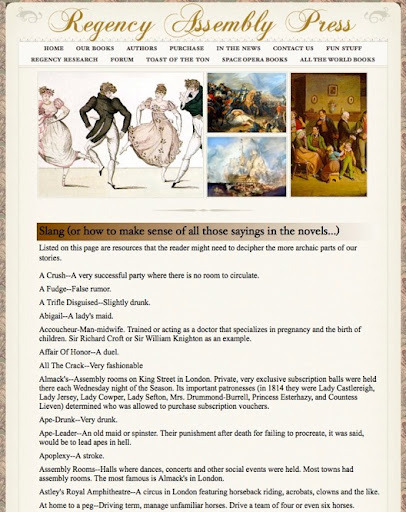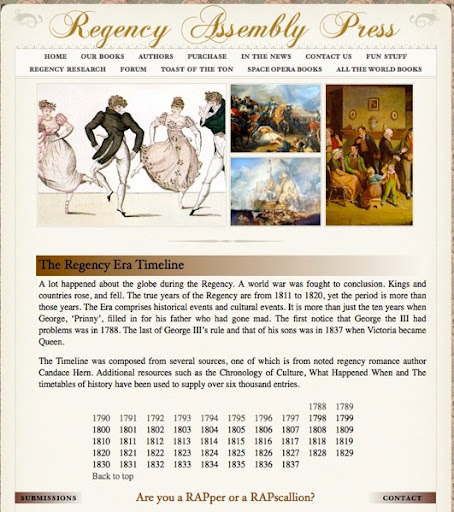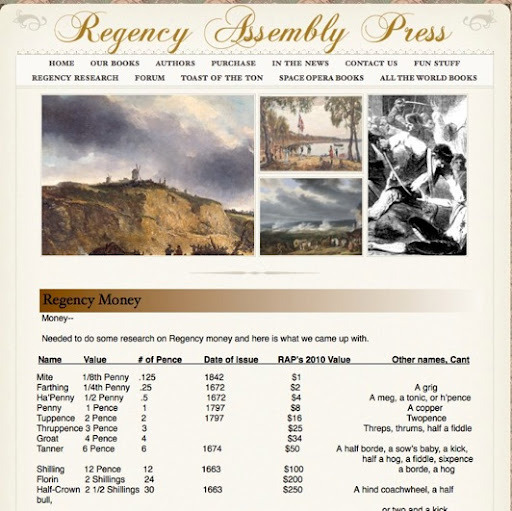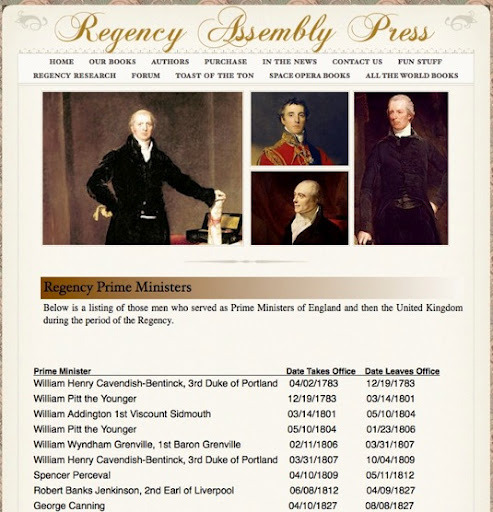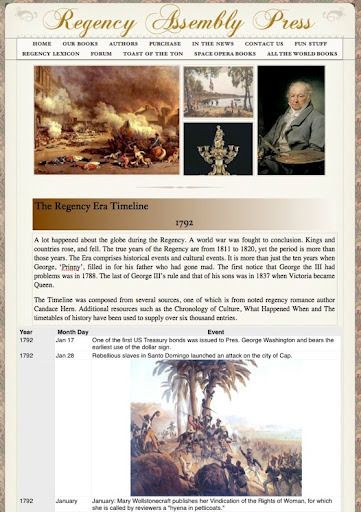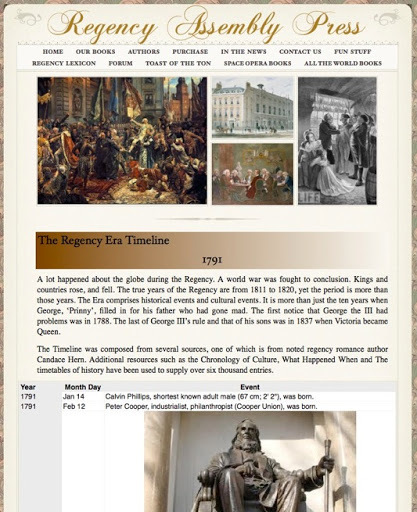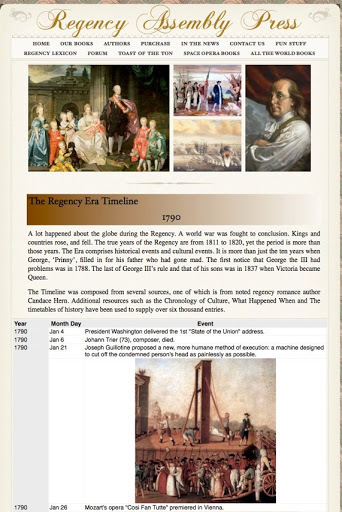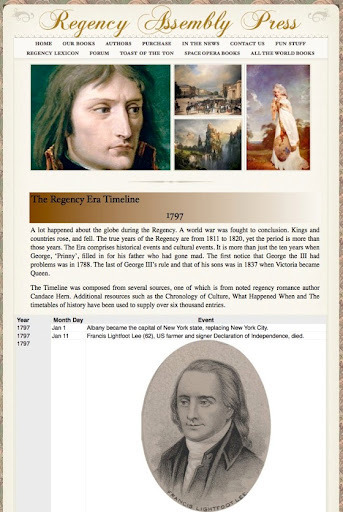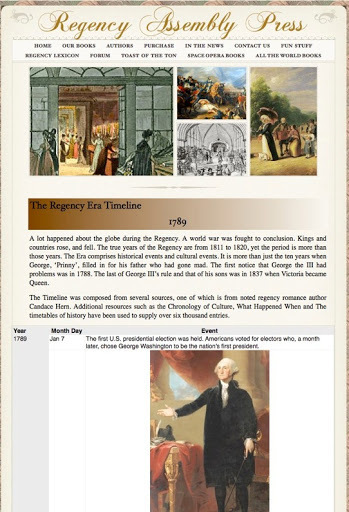D.W. Wilkin's Blog, page 351
June 15, 2012
Regency Era Prime Ministers-The Duke of Portland and the writing
Often in my research I keep needing to find who was leading the government and do this through every book. I thought that having the list handy would be good, and then turning it into a research webpage even better. Here is the list. After I post a few more Timeline years and write some more, I will work on the web page with notes about each PM.
The First PM I am doing in William Henry Cavendish-Bentinck and I am hosting a page devoted to him and then all our period PMs at Regency Assembly Press. That page is here.
William Henry Cavendish-Bentinck, 3rd Duke of Portland
04/02/1783
12/19/1783
Whig
William Pitt the Younger
12/19/1783
03/14/1801
William Addington 1st Viscount Sidmouth
03/14/1801
05/10/1804
William Pitt the Younger
05/10/1804
01/23/1806
William Wyndham Grenville, 1st Baron Grenville
02/11/1806
03/31/1807
William Henry Cavendish-Bentinck, 3rd Duke of Portland
03/31/1807
10/04/1809
Tory*
Spencer Perceval
10/04/1809
05/11/1812
Robert Banks Jenkinson, 2nd Earl of Liverpool
06/08/1812
04/09/1827
George Canning
04/10/1827
08/08/1827
Frederick John Robinson, 1st Viscount Goderich
08/31/1827
08/21/1828
Arthur Wellesley, 1st Duke of Wellington
08/22/1828
11/16/1830
Charles Grey, 2nd Earl Grey
11/22/1830
07/16/1834
William Lamb, 2nd Viscount Melbourne
07/16/1834
11/14/1834
Arthur Wellesley, 1st Duke of Wellington
11/14/1834
12/10/1834
Sir Robert Peel, 2nd Baronet
12/10/1834
04/18/1835
William Lamb, 2nd Viscount Melbourne
04/18/1835
08/30/1841
Tory* (Tory government, PM a Whig)
William Henry Cavendish-Bentinck, 3rd Duke of Portland
Born 04/14/1738
Died 10/30/1809 Bulstrode, Buckinghamshire
Major Acts:
Treaty of Paris 1783-End of the American War of Independence
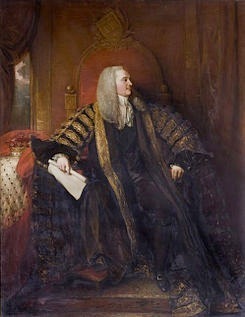
A tall, dignified and handsome man, Portland was prime minister for two short periods separated by over 20 years, but was not especially successful in either. The Duke of Portland entered Parliament via the House of Lords, by virtue of his title, in 1761. Chancellor of the University of Oxford. In 1783, he was appointed Prime Minister of the Whig administration by King George III and again from 1807 to 1809. The 24 years between his two terms as Prime Minister is the longest gap between terms of office of any Prime Minister. He was known before 1762 by the courtesy title Marquess of Titchfield. He held a title of every degree of British nobility—Duke, Marquess, Earl, Viscount, and Baron.
Lord Titchfield was the eldest son of William Bentinck, 2nd Duke of Portland and Margaret Cavendish-Harley and inherited many lands from his mother and his maternal grandmother. He was educated at Westminster and Christ Church, Oxford, and was elected to sit in the Parliament for Weobley in 1761 before entering the Lords when he succeeded his father as Duke of Portland the next year. Associated with the aristocratic Whig party of Lord Rockingham, Portland served as Lord Chamberlain of the Household in Rockingham’s first Government (1765–1766) and then as Lord Lieutenant of Ireland in Rockingham’s second ministry (April–August 1782); he resigned from Lord Shelburne’s ministry along with other supporters of Charles James Fox following Rockingham’s death.
The Duke of Portland’s first government was concerned with the power of the East India Company.
In April 1783, Portland was brought forward as titular head of a coalition government as Prime Minister, whose real leaders were Charles James Fox and Lord North. He served as First Lord of the Treasury in this ministry until its fall in December of the same year. During his tenure the Treaty of Paris was signed formally ending the American Revolutionary War. In 1783 Charles Fox attempted to persuade Parliament to pass a bill that would replace the company’s directors with a board of commissioners. George III made it known to the House of Lords that he would consider anyone voting with the Bill an enemy. As a result of this interference, Portland’s government resigned.
In 1789, Portland became one of several vice presidents of London’s Foundling Hospital. This charity had become one of the most fashionable of the time, with several notables serving on its board. At its creation, fifty years earlier, Portland’s father, William Bentinck, 2nd Duke of Portland, had been one of the founding governors, listed on the charity’s royal charter granted by George II. The hospital’s mission was to care for the abandoned children in London; and it achieved rapid fame through its poignant mission, its art collection donated from supporting artists, and popular benefit concerts put on by George Frideric Handel. In 1793, Portland took over the presidency of the charity from Lord North.
Portland served in the governments of other Whig leaders until his second government, over 20 years later. Along with many such conservative Whigs as Edmund Burke, Portland was deeply uncomfortable with the French Revolution and broke with Fox over this issue, joining Pitt’s government as Home Secretary in 1794. He continued to serve in the cabinet until Pitt’s death in 1806—from 1801 to 1805 as Lord President of the Council and then as a Minister without Portfolio.
In 1807 Portland became PM, insisting that he was still a Whig, despite heading a Tory government. In March 1807, after the collapse of the Ministry of all the Talents, Pitt’s supporters returned to power; and Portland was, once again, an acceptable figurehead for a fractious group of ministers that included George Canning, Lord Castlereagh, Lord Hawkesbury, and Spencer Perceval.
Portland’s second government saw the United Kingdom’s complete isolation on the continent but also the beginning of recovery, with the start of the Peninsular War. In late 1809, with Portland’s health poor and the ministry rocked by the scandalous duel between Canning and Castlereagh, Portland resigned, dying shortly thereafter.
By now too old and ill to run the government, he mostly left his Cabinet to do what they wanted. The period was marked by rivalry between two powerful ministers, Castlereagh and Canning, culminating in a duel between the two in 1809 over the running of the Peninsular War.
Portland resigned in 1809, just weeks before his death.
First Ministry
04/02/1783 12/19/1783
The Duke of Portland — First Lord of the Treasury
Lord Stormont — Lord President of the Council
Lord Carlisle — Lord Privy Seal
Lord North — Secretary of State for the Home Department
Charles James Fox — Secretary of State for Foreign Affairs
Lord Keppel — First Lord of the Admiralty
Lord John Cavendish — Chancellor of the Exchequer
Lord Townshend — Master-General of the Ordnance
Lord Northington — Lord-Lieutenant of Ireland
The Great Seal is in Commission
Second Ministry
03/31/1807 10/04/1809
The Duke of Portland — First Lord of the Treasury
Lord Eldon — Lord Chancellor
Lord Camden — Lord President of the Council
Lord Westmorland — Lord Privy Seal
Lord Hawkesbury, after 1808, Lord Liverpool – Secretary of State for the Home Department
George Canning — Secretary of State for Foreign Affairs
Lord Castlereagh — Secretary of State for War and the Colonies
Lord Mulgrave — First Lord of the Admiralty
Spencer Perceval — Chancellor of the Exchequer and of the Duchy of Lancaster
Lord Chatham — Master-General of the Ordnance
Lord Bathurst — President of the Board of Trade
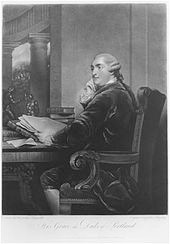
“My fears are not that the attempt to perform this duty will shorten my life, but that I shall neither bodily nor mentally perform it as I should.”
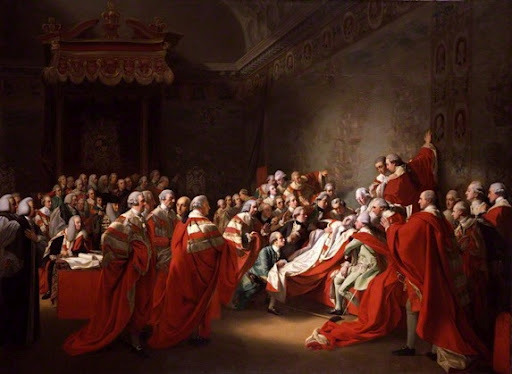
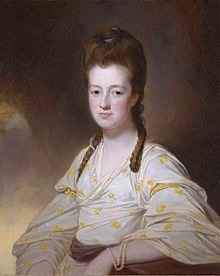
His wife Dorothy Cavendish, daughter of the 4th Duke of Devonshire. They had six children, 4 boys and 2 girls. The duke and duchess are the the 3x great grandparents of Queen Elizabeth II.
The Writing LIfe
My new writing project is another regency, tentatively titled The Heir. I am now over 180 pages into it. The heroine of course can not stand the hero, who is trying to understand why she dislikes him so. Part of the action takes place in St. James Square, where I have located our Heroine’s home. That was written about, in a blog post from fellow writer Angelyn Schmid on her post about Let’s do Business in Bed.
I enclose a few more paragraphs from the first draft first chapter.
Chapter 1 continued
Annabella suspected that Lady Elizabeth had been surprised that she had received an offer from the Earl. Annabella thought in all the stories she had read as a child, that was what would happen. Lady Elizabeth had read those stories to her in the schoolroom, and Annabella had first truly thought that her father and Lady Elizabeth were happy. Now, she was beginning to see that they were not happy like the people in her stories. Annabella wondered if anyone was ever as happy as the people in her stories.
“You must realize how scared she is not. For we are going to be in Town for more than six months and there will be many people who she does not know how to address well, in our house at St. James Square all treating her as the head of our social circle yet she will want to stay to her room and then…” Annabella stopped.
“Then you will again have to take over as hostess for your father, I know my lady. I am sorry. I should accompany you and be of aide, but your father has made it clear that in Town, your stepmother must be in charge. I must stay here. I will prepare the house for your return. It will be a tribute and your father will see that it supports all of his endeavors.”
“Then I thank you. I am sure that you shall see that the rest of the day’s packing goes smoothly and that her ladyship is not troubled should she ask for a thing. That you will see it done promptly knowing the burden that is shortly to be thrust upon her.” Annabella implied that the few requests that Lady Elizabeth made, and they were always just a few, were seen to, and not ignored or an issued made of it. Mrs. Drake nodded.
“You leave it all to me Lady Anna. I’ll see it gets done.”
“Thank you so much.” Mrs. Drake left and Annabella finished her coffee. She savored the quiet in the room, though there was still pandaemonium just outside the closed doors. When she stood, and entered the hall, and became a part of it, she would find that she would not be given the opportunity to catch her breath. The servants, when they saw her, she knew, would stop and ask her questions. The answer would invariably be “Please ask Mrs. Drake.” Or “That must be addressed to Lady Elizabeth.” She knew from experience that were she to make a decision, it would be followed.
Yet even were it the same decision that either Lady Elizabeth or Mrs. Drake would have made on moving day, and from her participation in previous moving days, Annabella knew that her thoughts would have served as theirs, the two ladies would be upset in no small way, that she would have taken it unto herself to have made known her thoughts.
Such was not done in the Earl’s household. Well it was done, Annabella reflected with great regularity. But when it was done, those two great forces that thought the control of the house was their prerogative took it upon themselves to feel as if some great conspiracy had been begun to rob of their very dignity.
Yet she loved each lady in ways the same and separate from the other. Each was a part of who she had grown to become. Annabella knew that she was emerging as a woman that was to be sought after, and not by the dregs of society that wanted to love her for her fortune, or the fortune the expected her to breed much as her father bred horses. Annabella knew that she had much more to give to a husband than a son which would enable him to be rich and powerful amongst the richest men of the world.
Annabella knew that the year of 1812 was sure to bring much change, and was also sure that England would show the world her colors. Not just Annabella showing London society her nature, but that the English were destined to make their mark, and this was the year it would happen.
Her father, she was sure, would be asked by Prime Minister Perceval to be a member of his cabinet. The Prince Regent had shown that he backed the Tories once he had become the Regent. He was much more liberal with his views before he actually came to power. The Whigs and Charles James Fox had thought the Prince Regent their fast friend. And her father had despaired that such was the truth of the matter. Coming into power, Prinny certainly saw that he benefited with friends who wanted a monarch.
And the eighth Earl of Bath was a supporter of the Tories all his life. He even ensured that the man who represented his pocket borough also held the same believes. Of course as a pocket borough, it was the Earl’s vote and only his vote that saw to the member going up to London and sitting in the Commons. Annabella was sure that the Whigs thought very ill of that.
The way outside was evident in the window that she sat looking out of. Annabella could open the window and step through to the outside of the house. She could escape and then none of the servants would ask her thoughts, opinions or desires. That was certainly enticing. She summoned a servant to take the tray of coffee away, and then stepped through the window and made her escape. The groundsmen, half of them, were inside the house helping with the packing. There was no need for a clipping of a flower, or a shrubbery to be packed and sent to Town. She was safe from any questions, except that some of the men wished her opinions only on what should be carted to town later when the flowers came back and bloomed in Spring.
Then, Combe Edinsley sent bunches of flowers twice a week to London to adorn the house in St. James Square. The efforts of the gardeners and groundsmen was greatly appreciated then. Three times during the season, in no specific date, she wrote to the estate that Mr. Tavish, who had the management of all the grounds, could have read her letters thanking the men that sent such abundance to London. She knew that it built morale amongst them. Her father had said that her mother had done the same, and Lady Elizabeth did trouble herself to write a letter as well, yet the groundsmen knew to expect it always on the 17th of June, and always a little short and perfunctorily done.
Annabella knew that a long letter written on how bright blue the chrysanthemum was and how when set in a drawing room, which she would describe for the men would never be up to London to see it. Though the carter would and report back how the flowers looked displayed. That meant the world. She had done this as an exercise first while still in the school room. Mr. Tavish had shared that the men had made him keep all of her letters, and that they would sit for a good hour or two, having a beer on the days her new letter would arrive. Then they would ask a favorite passage from one of the older ones be read as well.
Mr. Tavish had told her that nothing made the men love her more than her letters. So whenever a groundsman or gardener stopped to speak with her, it was always with great respect from them. She held that dear. The stablemen though, they thought nothing of her but her father’s spoiled daughter.
“Lady Anna, if you be looking for your father, he be back in the stables there aways.”
“Yes, thank you, Mr. McClure.” The head groom of the estate. And as one of the greatest source of income for Lord Lennox was the money from breeding, Mr. McClure was to be respected at every turn.
There were other sources of money for the Bath fortunes. A lot of land and tenancies, including in the city of Bath which had been part of the original land grant. Then the man of accounts of the Earl protected the fortune with investments in various things. A little here and a little there Mr. Becoomb was fond of saying.
“Father? Are you there?” She wandered into the stables. The groomsmen and lads were all respectful of her, but she knew that they thought her an interloper. That she only wished to have a riding horse, and did not care at all for the racing lines that they were breeding too. Her father also was looking to breed strong hunters as well, though he only went hunting when it was his turn to host the meet.
“Ah, back here Anna. Regal wants to run and we just can’t let him out yet.” Regal was the new favorite. Or the one the Earl was most concerned with that day. He had more than a dozen favorites and could talk for some time on how all of them were doing.
“Good horse,” she reached out and patted the animal. “One day you will race and win and all will admire you as much as your grandsire.”
“Well, if we find a buyer for him. I think Lord Cameron is ready to indulge and that will be a pretty penny.”
“A lot of sterling is what you mean, father.”
He laughed, “Yes Anna, a lot of sterling. Father had some good ideas when he bred from Eclipse and other great horses. We have the best stables in all the country I should wager.”
“Well, you don’t though. You let others purchase our mares and stallions and they race them. Why not us?”
The Earl shook his head. “I should do so locally, but I do not want to rush about and tend to such details as a race here, or there. There is already enough fuss living here or in London. I have little desire to live in the rooms in an Inn while traveling to a race. No, let some other have that fun, which I think is not at all. Besides my friends will travel to our stables here and purchase a champion.”
Hunters and racehorses, two sets of horses for the carriages, and one horse each for herself and the Countess to ride. The Earl did not ride his friends, and Annabella did not have a horse for a chaperone to accompany her. Last season that had been an issue and in London she did have an extra mount for that need. Here at Combe Edinsley, it was not necessary.
“Well, are you ready to return to the house any time soon. Your presence is of course sorely needed.”
He smiled, “Anna you know it is why I am here. Were I to come between my wife and my housekeeper I will only lose. A man never wins in such a match. And even when they both smile at me and pretend they are thanking me for arbitrating between them, they are both angered at me and thinking of some revenge upon me. And, then, if I am not incorrect about the way the wind is blowing, you have already seen to the worst of it, and my presence is not so sorely needed at all.”
She laughed, “That is indeed the way of it. How do you know these things.”
“I think all men do, but it may take some time for them to realize that they do. I should have dismissed Mrs. Drake when I married Elizabeth. But your new mama said that I should do no such thing as they were such good friends from her days when she was just your governess. There is no going back. That is a lesson that is hard to learn. We may long for such a time when we do not have the responsibilities, or positions that we have now, but when we try to return to the friendships that once were strong and now are colored by all that we have done, you learn, that you can only keep those of the past, if they have walked along side you in the present. There is no going back.”
Her father would often say things like that. And the last few years he had risen in the House of Lords to say such things as well. It made him seem very wise. The reason she was sure that he was talked about as a future appointee to the Cabinet.
But he was her father and she could also recognize that much of what the Earl said was also nonsense. A great deal was nonsense. And a lot of what he did was folly as well. Not taking the horses to races to see how they performed, but letting his customers do so, after they had brought the horse could result in tragedy. Some, who expected a better showing with their steeds had asked for their money back. Not in so many words, but hinted at such an action.
That the name Lennox and word swindle were some how linked. That was upsetting and she hoped that her father would respond by taking their racers out and showing everyone that they were winners. Yet still, despite their return to London, he was afraid. Perhaps it meant that Lady Elizabeth and he were very well suited to each other. That the man who had been called gregarious in his youth was not quite a recluse but wished to be, once his first wife died. And now, still, nothing had really changed.
When at home at Combe Edinsley, the Earl never left the property for all the months they lived there, and in Town, he was either at St. James Square, or the House of Lords. Seldom did he go anywhere else. Not even his clubs.
“You must venture into the fray soon, as you always do, and give all your blessing. They expect it and a few kind words about how pleased you are always seems to leave them at peace.”
He laughed, “Yes, come we shall return to the house, for I expect you have laid the groundwork for me. As long as I say how pleased I am and not make any decisions, I look the hero. Should I choose a side, then the war is truly on. Come, a few more hours of their packing and tearing the house apart and it shall be done. I have learned that with patience, much does resolve itself. And usually to ones benefit.”
Annabella hoped that was the case, but she was not as sure as her father.








June 13, 2012
A Regency Timeline 1793 Revisited and a new Regency Novel-The Heir
The Regency Timeline
My previous posts I’ve explained that I was working on the Regency timeline. I posted my entries for 1788 thru 1797.
Now I have the 1793 Timeline again. I went back added a significant amount of graphics. I will be doing this with all the years I previously posted and then ensuring that the new years have a lot of graphics as well.
I have uploaded all these years to the Regency Assembly Press website. You can see a little preview of this below in the picture. I especially like how the Duchess of Alba by Goya looks a lot like Cher.
My sources which include the Internet and The Timetables of History by Grun and Stein as well as the Chronology of CULTURE y Paxton and Fairfield should cover a lot of events. There are now over 5000 listed for the period between 1788 and 1837 when Victoria comes to the Throne. I have also just found a third book I own with timelines in it, very USA centric though.
as well as the Chronology of CULTURE y Paxton and Fairfield should cover a lot of events. There are now over 5000 listed for the period between 1788 and 1837 when Victoria comes to the Throne. I have also just found a third book I own with timelines in it, very USA centric though. 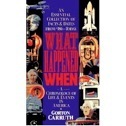 What Happened When by Carruth. I also have added a Dorling Kindersley book
What Happened When by Carruth. I also have added a Dorling Kindersley book 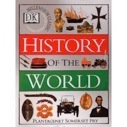 , History of the World.
, History of the World.
I may post a year at time every so often in between scanning through all these to find something that will be a good article for this blog and the blog at English Historical Fiction Authors. I will also have the full listing up shortly at Regency Assembly Press.
Those who have feedback, it is appreciated or if someone would like a specific year in a future post. The very first entry is to show who was Prime Minister of Great Britain, later it was the United Kingdom, during the period of the chronology. In choosing our dates, 1788 is the first sign of madness in George the III, it is the beginning of the end of the French Monarchy with the riots in Paris, it is the time when the mama’s of the girls during the true Regency would be girls going to London for their own season, and when our heroes are young lads or babes as well.
We need to know of the events that occurred when they were children, as well as what happens when they are on stage in our stories.
Click on the link below or the picture to go to the entry. More years coming. The list is now over 5000 event entries long and growing.
After the Regency Timeline, I plan to do a short addition on Regency Prime Ministers. They always come up in my research and I think we need a page where we can find out all about them in one place. Then, the Edwardian Timeline. I am thinking the years 1890 to 1918 (The end of WWI)
Regency Assembly Press 1793 Tineline
The Writing LIfe
My new writing project is another regency. I am now over 150 pages into it. The heroine of course can not stand the hero, who is trying to understand why she dislikes him so.
I enclose a few paragraphs from the first draft first chapter.
Chapter 1 continued
The choice was taken from her, “Anna, are you still abed. I need your help this day. Mrs. Drake is being a monster and will not listen to ought that I ask.” The countess had entered the bedchamber. From past experience, Annabella knew that if the two ladies were arguing not much would come of it. An impasse would be achieved, and an impartial party needed to be called. Usually though, the Earl arranged such matters. He was also the local magistrate and had many hours practice settling disputes.
“Oh Lady Elizabeth, you know full well that if Mrs. Drake has her feathers all in a ruffle, then the Earl himself does not stand a good change of making any progress.”
“She is close to that stage, I will say that, but she is not there yet. Though I fear should she fight me much longer on this, I will giver her the sack!” the Countess was as mad as Lady Annabella had ever seen her. She had threatened on occasion to sack all the members of the staff that remembered her when she was but a governess. This time, Annabella felt she might actually do such a thing.
“I shall get up and speak to her.” Annabella said.
“Oh, thank you. You know I can not see straight when that women puts her back up to me. I fear that were we in Town and such was to happen, then all would be a disaster for the servants would gossip all about the square and we would be an ondit as quick as Eclipse running a race.” The Earl used that expression all the time. He wanted many to know that his stables were full of horses sired from Eclipses line. Annabella knew that her grandfather had been a great fan of racing and had tried to find a winner six stallions sired by the famed horse.
Her father was a great admirer of racing at a distance, but thought that breeding was more to his liking. He had made a study of it, and several of the horses he sold were champions. Even during his depression over the death of her mother, Annabella knew her father took an active hand in the breeding program. She knew it gave him the only joy during those first few years when the loss had been with him at its strongest. Not a thing she had done seemed to bring him forth from his pains.
“It is a very good thing, then, that Mrs. Drake shall remain here in the country and we shall have but you to rely on for the running of our house in Town.” That thought brought great pleasure to the Countess whenever it was stated. The Earl had made it a rule, the first year of his second marriage, that Mrs. Drake saw to the management of the estate’s great house, but in town, a fifth of the staff was required, and several people were permanent to the house of St. James Square, so the Countess was made the supreme authority there.
Annabella learned from both ladies, but she had to concede that Mrs. Hayes was much better at household management, and the Countess, she was good, when she was well, of supporting the Earl in all endeavors he chose to immerse himself in. She always agreed with the Earl. Made sure when he went to her rooms, less frequently of late, if the gossip of the servants was worth acknowledging, that the Earl’s cares were dealt with.
Lady Elizabeth had spoken of these matters last year at this very time, for it was when they had prepared her for her season. A matter that it was fortunate Annabella had an aunt to help with. The Countess had never gone to London for a season, her father the Vicar not deeming it an expense for a woman destined to be a governess. Lady Beauchamp though had come to the aid of Annabella and secured vouchers to Almacks. Introductions to suitable young ladies and men, and urged the Earl to have a ball in Annabella’s honor.
She had callers. It was so. Three had emerged that she thought were charming. Their idea, she quickly learned was to marry her and beget a son so that the inheritance to the estate of Combe Edinsley and the title would pass to the boy, and they would come into management of the Earl’s wealth, once he was dead. None of the men who paid the compliment of proclaiming their lover for her was as sincere as their love for the inheritance.
Last season ended in disaster.
This season was not going to end the same. She was determined, but she would have some competition amongst those she had spent time with the previous year. Lady Beauchamp’s only daughter was to be presented this season, and Henrietta was a beauty. Much more than Annabella. Perhaps not destined to inherit a fortune. Lord Beauchamp, her cousin and the patriarch of that side of the family was not twenty and five, and yet the purse strings of the Beauchamp lands and fortunes were in his hands. A fact that the Earl spent a great deal of time trying to keep from letting all of the Beauchamp money slip through his nephews fingers.
When Viscount Beauchamp, the father had died, the son had debts of well over ten thousand, Annabella had heard. They were made whole of course, but the new Viscount, still, she heard the servants say, was prone to wager at White’s well over a thousand in a night. Many nights he would lose, but as all servants knew and were apprised of such matters, many nights her cousin the young Viscount would lose as well. Such matters concerned her aunt for she received an allowance from her son, and her son had to set aside money for Lady Henrietta’s dowry.
Annabella, dressed in the red frock and on her way to confront Mrs. Drake wondered what her own dowry was to be. Her father said it would be adequate, but she knew that most of what her father could give was tied to the estate. That basically until they produced a boy child, all the monies of any substance would be for her cousin. Unless her father saw fit to spend every penny and bankrupt the estate. Something he would be entitled to do, but would leave a poor taste for those who stayed after.
And all these thoughts had made an assault on her the last few days as she readied to move to London for the season with her family. She was the hope of keeping the title in the family or of marrying so well that she need not worry about the estate and people of Combe Edinsley or Bath.
“Mrs. Drake, all is in hand I take it? A move you have done many times since father decided to return to Town and sit in Lords some years ago.”
“Aye Lady Anna, all is in hand, except every single person of this house has forgotten all that we did but a year ago. They close rooms up, instead of pack. Knowing full well that we should pack first, see the family off, and then close up the rooms. Those assigned to the library decide they wish another assignment and without consulting myself, they trade. Yet they trade with one who has no notion of reading and so the books your father has listed that he would take to London, the footmen in the library, have no idea and so they have been entire shelves of books into boxes so that the Earl may have them in Town.”
Mrs. Drake looked cross. Annabella knew that the next thing that would be related would be tales about how Lady Elizabeth had interfered as well. That should Mrs. Drake say anything aloud that criticized the Countess, then Annabella would have to give the housekeeper a scold. “I have asked that coffee be brought to the day room. We shall have it all to our selves, and I should then like to discuss with you a matter of importance. Will you please join me.”
“Of course my lady, whatever you wish.” It was clear that Mrs. Drake thought her other duties were far more important, but she knew that refusing Annabella was no longer something she could do. Annabella was grown up now and soon, if the journey to London for the Season truly worked out, she would have her own household to manage.
When they opened the door to the room, Annabella saw that on two of the chaise lounges, the servants had put white cloth over them. There was a small card table, with four chairs about, that hadn’t be prepared for the family’s abandonment, and it would serve for the tray of refreshment that Thomas, the footman, was approaching with. Annabella pointed to the table and after the footman left, they say. Mrs. Drake, poured the hot liquid from the silver pitcher, and then added cream and sugar as well before handing Annabella the porcelain cup.
“I think that while we are away, it may indeed be time to redo some of these rooms. Did not you and Lady Elizabeth finally agree on colors and papers?” Annabella seeded the ground with an action she knew had resolved well.
Mrs. Drake, tense, answered, “Yes, though the Earl has been reluctant towards any change.”
“Because all the rooms had been last changed by my mother. I think that his lordship has run out of time and excuses while we are away this Season. Father will no doubt be asked to be in government, he does let his opinion be known so often in Lords, that I am informed he has followers in both houses. Mr. Perceval has written to father a great deal these last months and I believe he and the others of the cabinet rely on father for support.”
“It would be a great recognition if your father were asked to be a part of the cabinet. It is something that he greatly deserves.” Annabella had first thought that servants all thought that way. But she had grown wise as she had left the schoolroom. She saw that most of them did think that the Earl of Bath was a man to be respected as he was by many. But on any given day, jealousy or envy, or just hate and malice, lay behind the eyes of those who looked to the Earl as their employer. Man was only free when he had no master, and all men, even kings, had masters.
“Then you must understand, Mrs. Drake, how important we make the estate look modern. Both inside and out. I am sure Lady Elizabeth’s true fears is to be hostess, as she will have to be, to a house full of those involved in the running of our kingdom, or our empire. That is what shall occur in short order, and you know how Lady Elizabeth feels about being thrust amongst all the old families. She is terrified more than she will ever say of our trip to London.”
Mrs. Drake had calmed down from her seeming scatterdness that Annabella had observed. “Yes, Lady Elizabeth still, after all these years, still is trying to resolve her place in society. She is a Countess. She must act as such.”








June 12, 2012
Regency Research
For the last few days I have been back doing research for my regency stories. Research I find I do over and over, so I started a few posts about them, such as the Regency Prime Ministers, and Regency Money.
Those who have been following also know about the Regency Lexicon and the Regency Timeline, hard at work popping in graphics for 1793. That should be revised in a few days or so. Now I thought to bring all this together at the Regency Assembly Press webpages with a new starting page for the research.
Here are links to all of them.
Another section I will add soon will be the dates that Parliament met in session. I just found a new source for that part of my research.








June 11, 2012
Regency Money
Money–
Needed to do some research on Regency money and here is what I came up with.
Name
Value
# of Pence
Date of Issue
David’s 2010 Value
Other names, Cant
Mite
1/8th Penny
.125
1842
$1
Farthing
1/4th Penny
.25
1672
$2
A grig
Ha’Penny
1/2 Penny
.5
1672
$4
A meg, a tonic, or h’pence
Penny
1 Pence
1
1797
$8
A copper
Tuppence
2 Pence
2
1797
$16
twopence
Thruppence
3 Pence
3
$25
Threps, thrums, half a fiddle
Groat
4 Pence
4
$34
Tanner
6 Pence
6
1674
$50
A half borde, a sow’s baby, a kick, half a hog, a fiddle, sixpence
Shilling
12 Pence
12
1663
$100
a borde, a hog
Florin
2 Shillings
24
$200
Half-Crown
2 1/2 Shillings
30
1663
$250
A hind coachwheel, a half bull, or two and a kick
Crown
5 Shillings
60
1662
$500
a coach wheel , bull, bulls-eye
Half-Sovereign
10 Shillings
120
1817
$1,000
Pound
20 Shillings
240
1797
$2,000
a screen
Sovereign
20 Shillings
240
1817
$2,000
A goblin
Guinea
1 Pound 1 Shilling
252
1663
$2,100
yellow boy, yellow george
A Pony
25 Pounds
6,000
$50,000
A Pony
A Ton
100 Pounds
24,000
$200,000
A Ton
A Monkey
500 Pounds
120,000
$1,000,000
A Monkey
A Plum
100,000 Pounds
A whole lot
$200,000,000
A Plum
In figuring out what the value today of this kind of money is, I am going to use a few concepts. Darcy has an income of 10,000 a year and Bingley has 5,000. That is in pounds. The Common laborer might expect 15 to 20 pounds a year for his family.
A soldier earned a shilling a day. Or 18 pounds a year, 15 pence a day in the cavalry.
Let’s do a little David math. In 2010, a soldier should be earning about $30,000 to start. I am going to round up to $36,000 and bring that to $100 dollars a day, or 1 shilling equals a $100 dollars at the low end of the scale.
This makes Darcy’s money at $20 million and Bingley’s at $10,000,000
But look at Pemberly and Netherfield as we see them thanks to location choices by the directors of the movies. That is the kind of money it would take to run such an establishment. With Netherfield having fifty people on staff, there goes $1000 pounds of Bingley’s money, and that is wages. He has to feed and put all those people in livery as well. It isn’t cheap.








June 10, 2012
A Regency Timeline 1792 Revisited
The Regency Timeline
My previous posts I’ve explained that I was working on the Regency timeline. I posted my entries for 1788 thru 1797.
Now I have the 1792 Timeline again. I went back added a significant amount of graphics. I will be doing this with all the years I previously posted and then ensuring that the new years have a lot of graphics as well.
I have uploaded all these years to the Regency Assembly Press website. You can see a little preview of this below in the picture. I especially like how the Duchess of Alba by Goya looks a lot like Cher.
My sources which include the Internet and The Timetables of History by Grun and Stein as well as the Chronology of CULTURE y Paxton and Fairfield should cover a lot of events. There are now over 5000 listed for the period between 1788 and 1837 when Victoria comes to the Throne. I have also just found a third book I own with timelines in it, very USA centric though.
as well as the Chronology of CULTURE y Paxton and Fairfield should cover a lot of events. There are now over 5000 listed for the period between 1788 and 1837 when Victoria comes to the Throne. I have also just found a third book I own with timelines in it, very USA centric though. 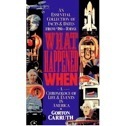 What Happened When by Carruth. I also have added a Dorling Kindersley book
What Happened When by Carruth. I also have added a Dorling Kindersley book 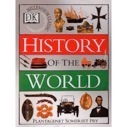 , History of the World.
, History of the World.
I may post a year at time every so often in between scanning through all these to find something that will be a good article for this blog and the blog at English Historical Fiction Authors. I will also have the full listing up shortly at Regency Assembly Press.
Those who have feedback, it is appreciated or if someone would like a specific year in a future post. The very first entry is to show who was Prime Minister of Great Britain, later it was the United Kingdom, during the period of the chronology. In choosing our dates, 1788 is the first sign of madness in George the III, it is the beginning of the end of the French Monarchy with the riots in Paris, it is the time when the mama’s of the girls during the true Regency would be girls going to London for their own season, and when our heroes are young lads or babes as well.
We need to know of the events that occurred when they were children, as well as what happens when they are on stage in our stories.
Click on the link below or the picture to go to the entry. More years coming. The list is now over 5000 event entries long and growing.
After the Regency Timeline, I plan to do a short addition on Regency Prime Ministers. They always come up in my research and I think we need a page where we can find out all about them in one place. Then, the Edwardian Timeline. I am thinking the years 1890 to 1918 (The end of WWI)
Regency Assembly Press 1792 Tineline








June 9, 2012
A Regency Timeline 1791 Revisited and a new Regency Novel-The Heir
The Regency Timeline
My previous posts I’ve explained that I was working on the Regency timeline. I posted my entries for 1788 thru 1797.
Now I have the 1791 Timeline again. I went back added a significant amount of graphics. I will be doing this with all the years I previously posted and then ensuring that the new years have a lot of graphics as well.
I have uploaded all these years to the Regency Assembly Press website. You can see a little preview of this below in the picture. I especially like how the Duchess of Alba by Goya looks a lot like Cher.
My sources which include the Internet and The Timetables of History by Grun and Stein as well as the Chronology of CULTURE y Paxton and Fairfield should cover a lot of events. There are now over 5000 listed for the period between 1788 and 1837 when Victoria comes to the Throne. I have also just found a third book I own with timelines in it, very USA centric though.
as well as the Chronology of CULTURE y Paxton and Fairfield should cover a lot of events. There are now over 5000 listed for the period between 1788 and 1837 when Victoria comes to the Throne. I have also just found a third book I own with timelines in it, very USA centric though. 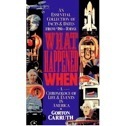 What Happened When by Carruth. I also have added a Dorling Kindersley book
What Happened When by Carruth. I also have added a Dorling Kindersley book 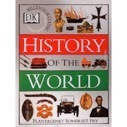 , History of the World.
, History of the World.
I may post a year at time every so often in between scanning through all these to find something that will be a good article for this blog and the blog at English Historical Fiction Authors. I will also have the full listing up shortly at Regency Assembly Press.
Those who have feedback, it is appreciated or if someone would like a specific year in a future post. The very first entry is to show who was Prime Minister of Great Britain, later it was the United Kingdom, during the period of the chronology. In choosing our dates, 1788 is the first sign of madness in George the III, it is the beginning of the end of the French Monarchy with the riots in Paris, it is the time when the mama’s of the girls during the true Regency would be girls going to London for their own season, and when our heroes are young lads or babes as well.
We need to know of the events that occurred when they were children, as well as what happens when they are on stage in our stories.
Click on the link below or the picture to go to the entry. More years coming. The list is now over 5000 event entries long and growing.
After the Regency Timeline, I plan to do a short addition on Regency Prime Ministers. They always come up in my research and I think we need a page where we can find out all about them in one place. Then, the Edwardian Timeline. I am thinking the years 1890 to 1918 (The end of WWI)
Regency Assembly Press 1791 Tineline
The Writing LIfe
I finished the Murder Mystery with our erstwhile Magician. I am looking for first draft readers to spot check me on their reception to the plot. The magic, the hyperbole. Did I give away the mystery or is it worth the time and investment in it.
Now onto the next project which is a Regency.
I enclose a few paragraphs from the first draft first chapter.
Chapter 1
The house, Combe Edinsley, was a bustle. As only a house with far too many servants could be when a commotion took them and everyone thought they were off on some important task.
Every year, after the winter festivities, the house was this way. Time to pack everything up so the transition to London could be completed. The Earl of Bath wanted to be in London for the first seating of the House of Lords. That was, he wanted the London home open and all in Town to know that he was back in residence and he would be in the second row, as was his wont, during every preceding conducted in Lords.
Henry Lennox, the eighth Earl had spent the first five years after his wife died in near seclusion at Combe Edinsley. He had found it difficult to face the matter. And face the daughter that his wife had left behind. Annabella, who had placed a pillow around her head to stop the noise that the house was creating, had been five when her mother had died. Ten, when she had told her father that things had come to exceedingly dire straits. That Combe Edinsley was becoming out of fashion and should he not attend to the matter, cobwebs would surely form in, of all places, the large portrait that Gainsborough had done of her mother.
Considered one of his last great works and done just a few years before the artist died, it was certainly a noteworthy piece. One that the house staff, would never let a cobweb grow on. Annabella had pointed out to the Earl an analogy for his life. She then said that she would soon be of an age where she would need mothering and that he was in need of an heir. That if he did not beget himself a wife to mother her, then she would have no idea what was expected of her. Annabella pointed out that the Earl could return to society, or that he could marry the governess, also quite acceptable as she liked her governess.
The Earl smiled and went for a long ride on his favorite horse. When he returned he mentioned that he did of course have an heir, her cousin Seabstian whose education at university he had just begun to pay for.
Annabella had not liked that, “Who is this man that I have never met, to take your money to benefit himself.”
Annabella remembered her father’s answer and the hole incident. “He is my heir, and though your mother and I had plans to give you several siblings such was not the case.”
“It is why you must remarry. Ms. Elizabeth told me all about that the house and title will go to your son, but you have no son.” Ms. Elizabeth was her governess, and though she was so much older than Annabella, Annabella did think her quite pretty and brave as well. Quite acceptable to marry her father, even though he was a peer, and she was just the daughter of a vicar.
“I have no son, but I do have an heir. He is the grandson of my father’s cousin. My grandfather’s brother was the brother of this man’s great grandfather if I have it right. He is Sebastian Lennox and a credit all say. If he is not to be my heir, I understand that Sebastian has two other brothers, one already serving aboard ship in the navy as a midshipman, as the father of these boys had also served as a ship’s officer. The second brother expects I believe that I shall buy him his commission with the army.”
Annabella knew that she had no smart thing to say that would not have had her father giving her a scold. She had not liked getting such from her father when she had been ten. Now, she expected to get such from him quite often. “Father, if you remarry then certainly you will have a son. I will have a brother and a mother and it will be wonderful.”
When her father returned from his ride, he announced that with the fortnight, he would have chosen his bride and then the next day went to Town. It was a days ride at most from their lands in Somerset. It was so, the sister, of his great friend Sir Lambert Marlowe, Lady Emily had accepted his suit and they were to be married.
The banns were read twice, and then Lady Emily ran off to Gretna Greene and married another. Annabella had quite decided that she did not like Lady Emily at all. Annabella, found that Lady Emily was not worthy of any forgiveness for her actions. The Earl of course forgave the woman.
The following year, acting as if the matter had never occurred, he married Ms. Elisabeth. Seven years of marriage and there was no sign of a child. Countess Elizabeth had despaired that there ever would be. The last few years past, she had also been ill on several occasions.
Right after the last celebrations of the season she had been ill, and then as the dreaded day came when the house was thrown in upheaval, she had recovered to oversee the matter. As always, Annabella was sure the housekeeper, Mrs. Drake would be ordering one thing, and the Countess, who once was well below Mrs. Drake as governess, would order the staff to do something else.
Annabella loved the Countess, but her father had made a grave error when he had listened to Annabella and had not married someone from his own class. The Earl was well out of his league in raising a child, which Annabella now suspected, was why he had followed her instructions regarding marrying the governess when Lady Emily had run off.
Lady Emily had sought on occasion to make amends for the humiliation she had done the Lennox family, no doubt at Sir Lambert’s urging. There had been a strain between her father and Sir Lambert ever since. Annabella and the Countess had never allowed the Earl to take up Lady Emily’s card, nor had they ever called upon Lady Emily. Such just could not be done. The snub had been too deliberate on her part when she ran off to Greta Green. And now there was no force in heaven or on earth that could reconcile that woman to the Lennox family.
Though one should pity Lady Emily, Annabella would allow. Her husband did not live in wedded bliss for more than three months before he challenged a man to a duel, and was killed in it. Lady Emily was left a widow and no child emerged, she soon enough was left with little society beyond that of the Marlowe family and some few other friends of Sir Lambert and the Earl that did maintain a friendship still with the lady.
A mistake of the heart for a moment by Lady Emily and she was denied the love that Annabella was sure to have given her as her stepmother. Now that love lavished on Lady Elizabeth, where it was wasted for the Countess had fears that she did not deserve it.
There was a knock at the door, and then a maid entered without waiting for instructions. It meant that Annabella had remained in bed much too long. The servants would indulge their betters for only so long, and then they would take matters into their own hands. Now Annabella could speak first to Mary, but Mary was not going to speak to Annabella. The maid first placed a tray down on a small side table near the bed. It had a pot of tea, toast or scones depending on what Mrs. Hayes had sent up, jams for the breads, and perhaps some fruit, or a cup of oatmeal. If Annabella wanted anything more to eat, she would have to dress and go downstairs.
Mary had gone the large, nine foot high draperies and pulled them aside. Even if Annabella had asked her to stop, or ordered her to do so, it would do little good. Mrs. Drake had the staff well trained. Even the Earl would not escape his draperies being hauled back once the clock read the ninth hour. A peers family did not lie in bed all day unless they were ill. The only such thing that Mary would stop her singleminded attempt to bring the day’s brilliance into the room.
“I have left the red dress out for you.” Annabella hated that dress. Which is why Mary chose it, of course. Not to punish her, but wearing it today, meant that it would not be packed to go to London.
It meant that it would stay back at Combe Edinsley to be laundered. She would not see it again till August. It was a great kindness. One day, the dress might even disappear to the poor basket and be distributed to the less fortunate families who were tenants on the estate.
Annabella reached for the tray of food and juggled it onto the bed. She poured herself a cup of tea and thought about dressing to join her father and stepmother in the breakfast room, or to just eat what was before her and then summon back the maid to help her dress. Her abigail would help her with her hair and she would be presentable to join the Countess in the day room for an hour or two before something else came up for her to do.
The Earl had certainly made plans to spend the day out of the house, having mentioned before that the last place that it was intelligent to congregate would be Combe Edinsley. Last year he had spent skulking about the sables, telling the head groom that it was important his best show horses made it to Town. Then of course they did not. Or rather the horses did, but the Earl ignored them the entire season. And he had forgotten to send a riding horse from the stables to town for her or the Countess, who had rather spent time in her carriage. A visit had to have been made to Tattersalls to secure a good mount for Annabella.
For while his lordship liked to be seen in the House of Lords, Annabella had liked to be seen in the Park. She was not horse mad, but she did like to ride, and the Park was where one did so. Though most rode to be observed by the other members of the Ton. Annabella rode to get exercise, the wind splashing her face with its buffets made such moments free of thought of what occurred at St. James Square, the site of their London home, or Combe Edinsley when she rode about the demesne.








Regency Era Prime Ministers
Often in my research I keep needing to find who was leading the government and do this through every book. I thought that having the list handy would be good, and then turning it into a research webpage even better. Here is the list. After I post a few more Timeline years and write some more, I will work on the web page with notes about each PM.
Prime Ministers of England
William Henry Cavendish-Bentinck, 3rd Duke of Portland
04/02/1783
12/19/1783
William Pitt the Younger
12/19/1783
03/14/1801
William Addington 1st Viscount Sidmouth
03/14/1801
05/10/1804
William Pitt the Younger
05/10/1804
01/23/1806
William Wyndham Grenville, 1st Baron Grenville
02/11/1806
03/31/1807
William Henry Cavendish-Bentinck, 3rd Duke of Portland
03/31/1807
10/04/1809
Spencer Perceval
10/04/1809
05/11/1812
Robert Banks Jenkinson, 2nd Earl of Liverpool
06/08/1812
04/09/1827
George Canning
04/10/1827
08/08/1827
Frederick John Robinson, 1st Viscount Goderich
08/31/1827
08/21/1828
Arthur Wellesley, 1st Duke of Wellington
08/22/1828
11/16/1830
Charles Grey, 2nd Earl Grey
11/22/1830
07/16/1834
William Lamb, 2nd Viscount Melbourne
07/16/1834
11/14/1834
Arthur Wellesley, 1st Duke of Wellington
11/14/1834
12/10/1834
Sir Robert Peel, 2nd Baronet
12/10/1834
04/18/1835
William Lamb, 2nd Viscount Melbourne
04/18/1835
08/30/1841








June 5, 2012
A Regency Timeline 1790 Revisited (Many more graphics) More on the writing life
The Regency Timeline
My previous posts I’ve explained that I was working on the Regency timeline. I posted my entries for 1788 thru 1797.
Now I have the 1790 Timeline again. I went back added a significant amount of graphics. I will be doing this with all the years I previously posted and then ensuring that the new years have a lot of graphics as well.
I have uploaded all these years to the Regency Assembly Press website. You can see a little preview of this below in the picture. I especially like how the Duchess of Alba by Goya looks a lot like Cher.
My sources which include the Internet and The Timetables of History by Grun and Stein as well as the Chronology of CULTURE y Paxton and Fairfield should cover a lot of events. There are now over 5000 listed for the period between 1788 and 1837 when Victoria comes to the Throne. I have also just found a third book I own with timelines in it, very USA centric though.
as well as the Chronology of CULTURE y Paxton and Fairfield should cover a lot of events. There are now over 5000 listed for the period between 1788 and 1837 when Victoria comes to the Throne. I have also just found a third book I own with timelines in it, very USA centric though. 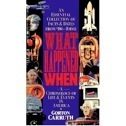 What Happened When by Carruth. I also have added a Dorling Kindersley book
What Happened When by Carruth. I also have added a Dorling Kindersley book 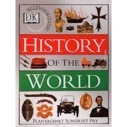 , History of the World.
, History of the World.
I may post a year at time every so often in between scanning through all these to find something that will be a good article for this blog and the blog at English Historical Fiction Authors. I will also have the full listing up shortly at Regency Assembly Press.
Those who have feedback, it is appreciated or if someone would like a specific year in a future post. The very first entry is to show who was Prime Minister of Great Britain, later it was the United Kingdom, during the period of the chronology. In choosing our dates, 1788 is the first sign of madness in George the III, it is the beginning of the end of the French Monarchy with the riots in Paris, it is the time when the mama’s of the girls during the true Regency would be girls going to London for their own season, and when our heroes are young lads or babes as well.
We need to know of the events that occurred when they were children, as well as what happens when they are on stage in our stories.
Click on the link below or the picture to go to the entry. More years coming. The list is now over 5000 event entries long and growing.
Regency Assembly Press 1790 Tineline
The Writing LIfe
I am now 330+ pages (over 100,000 words) on A Magician Murder Mystery. A had a good idea for a mystery, with a twist. What if the sleuth is a magician. I am looking for readers for this. Thirty years ago I wrote a mystery. And this is now my second. The first I know needs help. This though is working well. But then, a mystery needs a little more care I think then my regencies, etc. I could use other eyes if anyone is interested to be sure that I am hiding the clues well enough. That, the plot flows, and that the reader can put the entire thing together by the end.
I enclose a few more paragraphs from the first draft and now the start of the second chapter.
Chapter 2
Lance was not going to give him a lot of time to study the material, Eric knew. There was a UPS store near Dunsmuir and he could make copies of the relevant pages. After doing his marketing, he could stop there.
That way, as Lance had done before Eric had started making pages, when Lance would ask ‘what about the timing when I have to get out of the box on the page with the three stars…’ Eric would be able to look at his copies and talk Lance through it. Lance would then say that he was glad Eric thought to make copies.
Lance knew he would now. It would have saved time, if Lance had made the copies for Eric, but he couldn’t be bothered. That was what the people who did the work did. Not what the people who came up with the ideas did.
Lance could have thought of a trick with such a broad outline as the Magician disappears in a puff of smoke, and then reappears at the back of the hall a moment later. It would be up to Eric to make the trick work. Of course that trick was easy enough and they figured that our years ago. Old school.
As assistants had to have doubles that you could not see that there was a difference between from the audience, so too did the magician. Right height, right body size, a wig to make the hair match. And the ability to move your mouth to pretend to be speaking as the magician was actually talking.
The gag went something like the magician leaving the stage for a moment to fetch a towel, or get a drink of water. That was the switch with the double. Then the double would pretend to do the spiel as he walked over to a trap door in the stage. He would throw, or now, the stage would have it’s own blackout, smoke explosive. In that instance the trap door opens and the double falls through when the audience can’t see what is happening.
A moment later, booming voice from the back of the house, the magician starts walking down towards the stage. Perfect trick.
Lance had a library as good as Eric’s. He even had read two or three of the books in it. At least he knew he had them on the shelves. Eric was the one to study the works and see ways to make the trick work. Fifteen minutes at the printing part of the shop, and he had a working duplicate of the notebook. He even had it perf bound so he could lie back on the couch in his apartment and not have to worry about the papers being all over the place.
Rents were not that cheap in this side of town. He lived across from Park La Brea, but he had made good money when he first moved into the area. The card club job. His skills with cards for his tricks had made it so that he knew where cards were in a deck that he was dealing. He even had shown the manager how he could rig a game, if that was ever needed.
The man was a friend of Ephron Calman of the Palace. That was how Eric had gotten his audition performance. When he choked the manager of the card club didn’t hold it against him. But when they later did throw a couple games, the guy got nervous and had Eric move along. If he hadn’t opened his mouth, Eric might still have been there, making double what he did at Wal-Mart. Now though, the extra money from his part-time gigs, and the spots at the Palace of Magic almost got him back to where he had been.
After seven years though, he should have been further ahead. Sometimes, especially after he borrowed money from Lance, he would cruise to one of the other card clubs and put his skills to work as a player, not as a dealer. And not for a lot of money. Three hundred at one place, two hundred at another. The management was always looking for those who cheated regularly and for a lot of money. Things that were not good happened to those who spent too much time at the clubs and were too lucky.
It was just past eleven when he got to his apartment. He had a shift at four, at the store. Then an early shift the following day. He would have to eat his lunch-dinner at about two thirty, and then get ready for work. Seven miles and it took twenty minutes to half an hour to get to work. He just loved traffic in Los Angeles. And Eric meant that in the way that everyone meant it. He hated it.
Spreading out on the couch, Eric started to read through the notebook and see if Lance had done the work. Over the years he had gotten better at thinking through illusions. He had notes about what his script was going to be. Directions for the assistants. Lots of holes, but better than when they first met.
Then it was Eric who had the notebooks, and Lance had just scraps of paper, though they were in a manila folder, if you could call that being organized. When Lance saw Eric’s notebooks he thought it was a great idea and went and bought a pack of a dozen. This might have been the fifth of that initial dozen.
Eric was into his third dozen, he could see, glancing to the bookshelf.
Eric laughed. Lance had thought he was so smart when they had first become friends. Lance had gotten the gig at the Palace of Magic, and Eric had bombed. Then a few weeks later after they begun hanging out, Lance still making just the minimum for one show a week, he started read Eric’s notebooks. That was when Lance’s act began to grow. When he got more performances.
Lance took what was in Eric’s notebooks and added it into his show. Then at a dinner to celebrate the extra shows he had gotten, an expensive dinner at the Mario Batali restaurant, Osteria Mozza, Lance told Eric that he had been filching ideas from Eric’s notebooks.
At first Eric was upset. A magician should not steal another’s ideas. That was part of the game for the professionals. Reverse engineering other professions would call it. Working backwards to see if you could figure out the trick. He shared with Lance what was in some of his notebooks, but not all. Yet Lance had taken to looking at the notebooks when Eric wasn’t watching.
“Look, I wouldn’t have mentioned and you’re right, I shouldn’t have done it. But I got more performances, and that means more money. Calman is not paying me enough so I can afford my own apartment, the new car. It is good money, and maybe even better money with the right tricks.”
“My ideas, and you make money. That’s not fair at all.”
“I promise I’ll make it up to you. But you know you can’t do the tricks. And some, like you told me before, are the ones that have been around forever.” Lance said.
“Those anyone can have. The tricks I thought of are mine.” Eric was really pissed off, but he couldn’t make a scene in the middle of a posh celebrity chef restaurant. Lance played that part perfectly.
“Look, you told me it is traditional to buy someone’s tricks. I’ll pay you for the ones I’ve taken. I shouldn’t be the only one to make money from them. And then later, one day, I’ll remember and make sure you are paid everything. Really. You’re my only friend in all of Los Angeles. I should have asked first, but I thought you would say no because you are still mad at Mr. Calman.”
Eric was still mad at Calman. That anger would not go away, especially as the years went by and Calman made it difficult even for Eric to do his card tricks, which he never screwed up, in the lounge. Never screwed up unless he drank too much.
Lance did pay for the tricks, a bit, and then asked for help with some of the other tricks. Eventually, Eric would come up with a trick that was particularly good for Lance. One that would go well in Vegas or on a talk show. Lance did even hesitate to pay as he got richer.
As Eric thumbed through the current ideas in the notebook, remembering how Lance had stolen ideas from him made him smile. Now though he could see how far Lance had come in his concepts. The bullet points and sketches along the sides of each page showed Lance’s showmanship. His grasp of how to milk the audience just right. The trick itself, that was something unexpected.
As Lance had said, it was series of tricks related to each other. Fourteen tricks. Which would fill an hour show. Or several that were related and a few that you could make seem related. But the techniques, or ideas were not something that Eric ever expected to see from Lance. Part old craft mastery and something totally different. How do you take a solid piece of plywood and have a mark test it first. Take a spray paint can and sign his name, then lay it on the floor and then place the box over it? How could you now get through the floor, and Lance wanted Eric to figure that out.
Only two cups of coffee, the aspirin, the hangover headache, and soon he began to doze. A nice nap and he would be ready for work that night.
Then there was a knocking at the door. “Mr. Wise. Eric Wise, are you home!”
Eric heard it. “One minute.” He shouted back at the door. You always had to raise you voice a bit to be heard through a closed door. He had a window that could see the landing in front of his apartment. He was on the second story of a courtyard building.
Two shapes with coats. Knocking like that, they were probably not Mormon missionaries. He got up and closed the notebook that had been on his chest. He put it on the coffee table. It was almost two o’clock.
Opening the door he found two men, sunglasses on, coats and ties like he had seen through the window. “Hello?” He asked tentatively.
One placed a shiny thing up to the screen door, a badge. “Are you Mr. Eric Wise?”
“Yes. Are you some kind of cop?”
“Mr. Wise I am detective Johnson and this is detective Bailey. Can we come in and ask you a few questions?” The taller one, closer to the door, with the badge said.
“Yes, of course.” Eric fumbled with the latch on the screen door. It was always sticking. What was he going to tell the cop, no? You can’t come in unless I have a lawyer? That would sound guilty.
Finally he got the latch to work and let the men in. He also had a very healthy yawn come up. “Sorry, I was taking a nap. Is something wrong. I don’t have any parking tickets or anything.” He might have misrepresented some of the money he had on his taxes, since for some gigs he was paid in cash. No receipts. But the local police didn’t come to talk to you about that, did they?
The first one, Johnson said, “Do you know a Lance Silverton?”
“Yes. He’s a friend. Is something wrong? Did something happen to Lance?”
The two exchanged a look. The second one, Bailey said, “You probably should sit down.”
That was a cliche. He was in a business where you used a lot of cliches. He had a suspicion what was coming next and went to sit. “He’s dead?”
“I didn’t say that? What makes you think he’s dead?” The first cop said.
Eric had sat back down on the sofa. “What makes me think he’s dead? You just told me to sit down. That’s what everyone tells someone when they have really bad news.” Bailey gave Johnson a look that would have been fairly obvious if they were performers. Homer Simpson would have a word for that.
“Yes,” Johnson then said. He shifted his weight and Eric saw the holstered gun the man carried. Guns could be dangerous. Even in magic, where sometimes a trick called for a gun. If you screwed up and bought real bullets instead of caps, or used the caps too close to yourself, that was the way to court disaster. Eric did not like guns.
Johnson continued. “Mr. Silverton is dead. When was the last time you saw Mr. Silverton? There was an entry in his calendar with your name on it.”








June 3, 2012
A Regency Timeline 1797
The Regency Timeline
My previous posts I’ve explained that I was working on the Regency timeline. I posted my entries for 1788 thru 1796. Now I have the entrees for 1797 and have uploaded all these years to the Regency Assembly Press website. You can see a little preview of this below in the picture.
My sources which include the Internet and The Timetables of History by Grun and Stein as well as the Chronology of CULTURE y Paxton and Fairfield should cover a lot of events. There are now over 5000 listed for the period between 1788 and 1837 when Victoria comes to the Throne. I have also just found a third book I own with timelines in it, very USA centric though.
as well as the Chronology of CULTURE y Paxton and Fairfield should cover a lot of events. There are now over 5000 listed for the period between 1788 and 1837 when Victoria comes to the Throne. I have also just found a third book I own with timelines in it, very USA centric though. 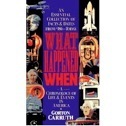 What Happened When by Carruth. I also have added a Dorling Kindersley book
What Happened When by Carruth. I also have added a Dorling Kindersley book 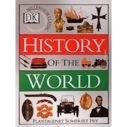 , History of the World.
, History of the World.
I may post a year at time every so often in between scanning through all these to find something that will be a good article for this blog and the blog at English Historical Fiction Authors. I will also have the full listing up shortly at Regency Assembly Press.
Those who have feedback, it is appreciated or if someone would like a specific year in a future post. The very first entry is to show who was Prime Minister of Great Britain, later it was the United Kingdom, during the period of the chronology. In choosing our dates, 1788 is the first sign of madness in George the III, it is the beginning of the end of the French Monarchy with the riots in Paris, it is the time when the mama’s of the girls during the true Regency would be girls going to London for their own season, and when our heroes are young lads or babes as well.
We need to know of the events that occurred when they were children, as well as what happens when they are on stage in our stories.
Click on the link below or the picture to go to the entry. More years coming. The list is now over 5000 event entries long and growing.
Regency Assembly Press 1797 Tineline








A Regency Timeline 1789 Revisited (Many more graphics)
The Regency Timeline
My previous posts I’ve explained that I was working on the Regency timeline. I posted my entries for 1788 thru 1796.
Now I have the 1789 Timeline again. I went back added a significant amount of graphics. I will be doing this with all the years I previously posted and then ensuring that the new years have a lot of graphics as well.
I have uploaded all these years to the Regency Assembly Press website. You can see a little preview of this below in the picture. I especially like how the Duchess of Alba by Goya looks a lot like Cher.
My sources which include the Internet and The Timetables of History by Grun and Stein as well as the Chronology of CULTURE y Paxton and Fairfield should cover a lot of events. There are now over 5000 listed for the period between 1788 and 1837 when Victoria comes to the Throne. I have also just found a third book I own with timelines in it, very USA centric though.
as well as the Chronology of CULTURE y Paxton and Fairfield should cover a lot of events. There are now over 5000 listed for the period between 1788 and 1837 when Victoria comes to the Throne. I have also just found a third book I own with timelines in it, very USA centric though. 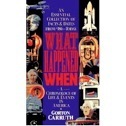 What Happened When by Carruth. I also have added a Dorling Kindersley book
What Happened When by Carruth. I also have added a Dorling Kindersley book 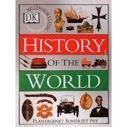 , History of the World.
, History of the World.
I may post a year at time every so often in between scanning through all these to find something that will be a good article for this blog and the blog at English Historical Fiction Authors. I will also have the full listing up shortly at Regency Assembly Press.
Those who have feedback, it is appreciated or if someone would like a specific year in a future post. The very first entry is to show who was Prime Minister of Great Britain, later it was the United Kingdom, during the period of the chronology. In choosing our dates, 1788 is the first sign of madness in George the III, it is the beginning of the end of the French Monarchy with the riots in Paris, it is the time when the mama’s of the girls during the true Regency would be girls going to London for their own season, and when our heroes are young lads or babes as well.
We need to know of the events that occurred when they were children, as well as what happens when they are on stage in our stories.
Click on the link below or the picture to go to the entry. More years coming. The list is now over 5000 event entries long and growing.
Regency Assembly Press 1789 Tineline









